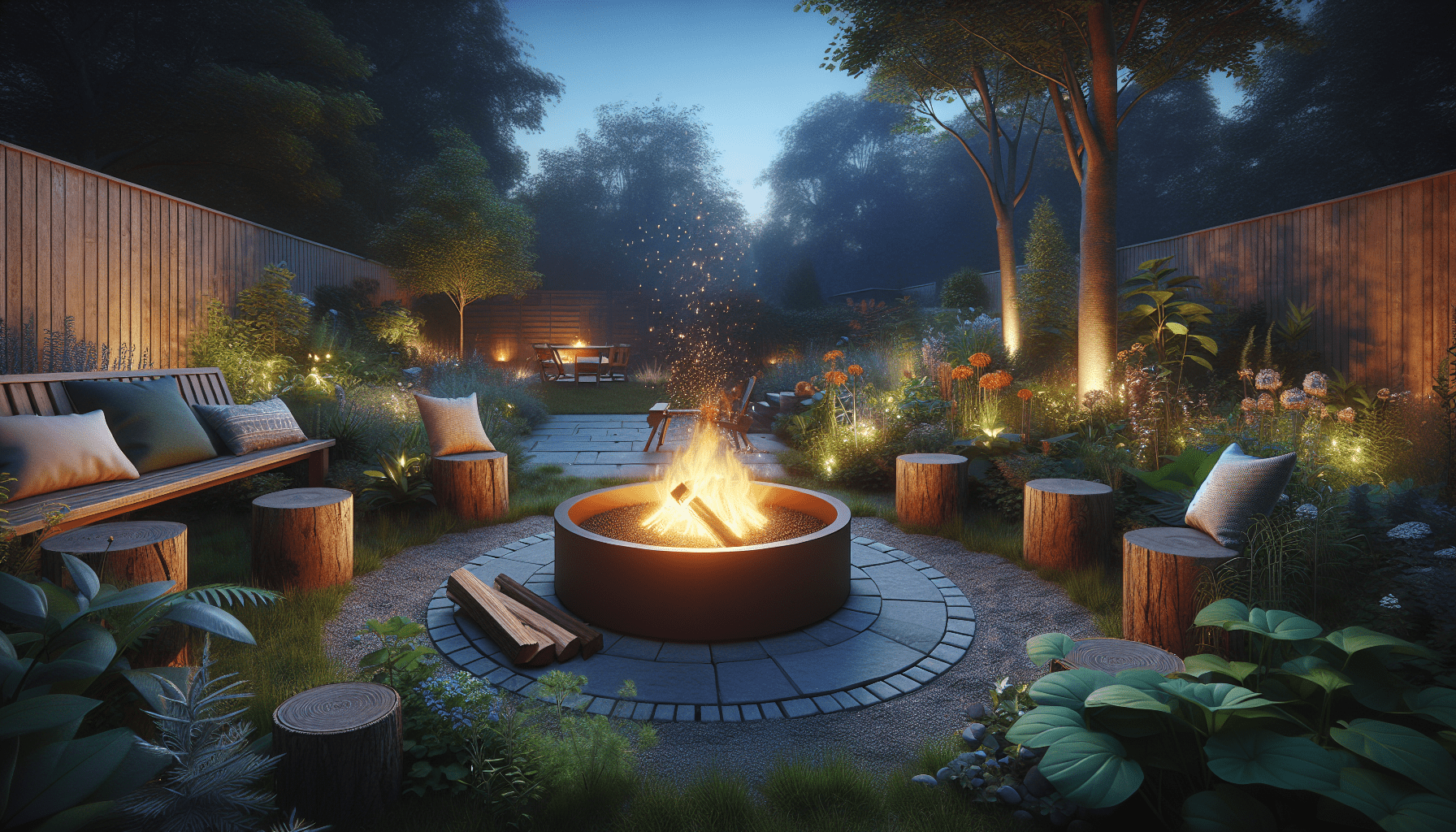Have you ever found yourself dreaming of cozy evenings gathered around a crackling fire in your backyard? The warmth, the glow, and that delicious aroma of wood burning can transform your outdoor space into a haven of relaxation. But while the idea of a wood-burning fire pit is alluring, it’s essential to understand how to operate it safely to avoid any mishaps. Let’s talk about how you can achieve that perfect blend of enjoyment and safety.

Understanding Your Fire Pit
What is a Wood-Burning Fire Pit?
A wood-burning fire pit is more than just a decorative piece in your yard; it’s an outdoor tradition that brings people together. These pits range from portable designs to permanent installations, coming in a variety of styles and materials. They create a central gathering spot, whether it’s for roasting marshmallows or sharing stories under the stars.
Why Safety is Important
Safety should always be your top priority when working with fire. A fire pit, no matter how beautiful or inviting, can pose several risks, from stray embers igniting surrounding materials to burns and other accidents. Understanding the potential hazards allows you to enjoy your fire pit while minimizing risks.
Selecting the Right Location
Choosing a Safe Spot
Before you light that fire, finding the right place for your fire pit is crucial. You need to consider several factors:
- Distance from Structures: Make sure your pit is at least 10-15 feet away from your home, trees, and other structures to prevent any accidental fires from spreading.
- Level Ground: A flat, stable surface ensures that your fire pit won’t tip over, and it helps control the fire better.
- Wind Direction: Be aware of wind patterns in your area. Placing your fire pit where the wind blows away from your home and others will help keep stray sparks at bay.
Considering Local Regulations
It’s also vital to check local regulations regarding fire pits. Some areas have specific rules about fire pits, such as permits or restrictions on size and materials. Familiarizing yourself with these guidelines can save you from penalties and ensure everyone’s safety.
Preparing for Use
Gathering Wood
Choosing the right wood can genuinely enhance your fire pit experience. Here’s a quick guide:
| Wood Type | Characteristics | Best For |
|---|---|---|
| Hardwoods (e.g., oak, maple) | Burns longer and hotter | Extended sessions |
| Softwoods (e.g., pine, cedar) | Burns quickly, great for starting fires | Quick kindling |
| Treated lumber | Not recommended | Highly toxic when burned |
Using untreated, seasoned wood reduces smoke and ensures a cleaner burn. Additionally, avoid using wood with chemicals, such as painted or treated wood.
Gathering Supplies
Before starting your fire, gather the necessary tools and supplies:
- Fire Pit Tools: Long-handled tongs, a poker, and a fire extinguisher are essential for controlling the flames.
- Seating: Ensure that your seating area is cozy and away from the fire pit to avoid any unintentional burns.
- Protective Gear: Consider having gloves and a bucket of water or sand nearby, just in case. You never know when a spark will decide to take a leap.

Starting the Fire
The Right Technique
Starting a fire in your pit is both an art and a science. Follow these steps to ensure a successful ignition, keeping safety in mind:
-
Use Dry Kindling: Start with dry leaves, twigs, or newspaper. This will create the initial spark needed to ignite your logs.
-
Arrange Your Fuel: Stack your wood in a teepee or log cabin configuration. Ensure there’s enough airflow to facilitate burning.
-
Light Safely: Use a long lighter to ignite your kindling, and stand back as the flames begin to grow.
Managing the Fire
Once your fire is lit, monitoring it is essential. Keep a close eye on the flames and log placement. If the fire begins to smolder, you may need to add more wood or gently adjust logs for airflow.
Maintaining Safety During Burning
Guidelines to Follow
Being vigilant while enjoying your fire pit can make a significant difference. Here are some guidelines to keep in mind:
- Always Supervise the Fire: Never leave your fire unattended, especially if children or pets are present. Their curious little minds might get too close for comfort.
- Limit Fire Size: A large fire can quickly become uncontrollable. Keep it at a manageable size for better regulation.
- Douse Properly: When you’re ready to extinguish the fire, don’t just let it burn out. Use water or sand to fully douse the flames. Stir the ashes to ensure nothing is hot before you leave the area.
Fire Pit Covers and Mesh Screens
Using a mesh screen cover while the fire is burning can minimize the risk of embers escaping and igniting nearby materials. These screens provide a barrier that also helps reduce wind exposure, making your fire more stable.
Caring for Your Fire Pit
Cleaning After Use
Maintaining your fire pit is crucial for longevity and safety. Regular cleaning prevents residue buildup and keeps the area tidy. After each use, let the pit cool down, and then:
- Remove Ashes: Use a shovel or scoop to collect ashes. Dispose of them properly, ensuring they are completely cooled first.
- Clean the Surrounding Area: Make sure no debris or combustible material is nearby. This simple step can prevent accidents.
Seasonal Maintenance
As the seasons change, your fire pit may require additional care. If you live in an area with harsh winters, cover your pit to protect it from snow and ice. Additionally, inspect for any damage before the fire season begins again.
Creating the Perfect Atmosphere
Comfort and Ambiance
Beyond safety and practicality, creating a comfortable and inviting space enhances your backyard experience. Here are some ways to do just that:
- Seating Arrangements: Comfortably arranged seating encourages social interaction. Consider using outdoor cushions for added coziness.
- Lighting: Use fairy lights or lanterns to create a warm ambiance as the sun sets. Soft lighting can enhance the magical feel of the evening.
- Entertainment: Bring along a guitar or a cozy blanket for storytelling or sing-alongs. After all, what’s a fire pit gathering without shared stories?
Snacks and Drinks
No fire pit evening is complete without snacks! Consider roasting marshmallows, hot dogs, or having a selection of your favorite beverages. This adds a sense of festivity to your gatherings.
Being a Responsible Neighbor
Communicating with Neighbors
When using your fire pit, it’s always a good idea to inform your neighbors. They may have concerns about smoke or noise. Keeping an open line of communication can foster good relationships and make everyone feel more comfortable.
Being Mindful of Smoke
You might enjoy the smell of burning wood, but others may not. Be conscious of wind direction, which can blow smoke into your neighbor’s yard. If it’s a windy day or if you notice complaints, it might be worth postponing your fire plans.
Conclusion: Enjoying Your Fire Pit Magic
Operating a wood-burning fire pit in your backyard can be one of the simplest joys of summer evenings and crisp fall nights. With a little knowledge about safety and maintenance, you can create lasting memories around the fire, making those chilly nights cozy and inviting.
Remember, whatever adventures your fire pit brings, it’s all about enjoying the warmth, the company, and the beautiful display of flickering flames. So go ahead and light that fire, let the stories flow, and savor every moment of that soothing glow!

